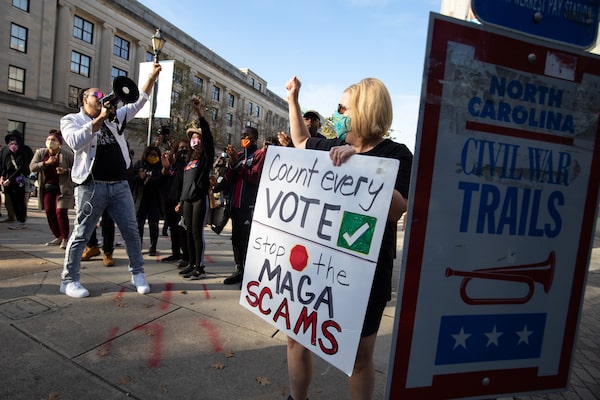
Rev. Greg Drumwright (L) leads a chant as counter-protesters confront supporters of U.S. President Donald Trump during a rally to protest results from the 2020 Presidential election in Raleigh, North Carolina, on Nov. 14, 2020.LOGAN CYRUS/AFP/Getty Images
Lloyd Axworthy is chair of the World Refugee Council and a former foreign affairs minister of Canada.
Ever since I retired from Parliament in 2000, I’ve headed election observer missions in three different countries – Sierra Leone, Peru and Ukraine – each of which have provided a unique perch from which to observe the dynamic between the power of citizens exercising their franchise and forces trying to suppress voting because of some combination of greed, ideology or unadulterated ego.
May 14, 2002, was election day in the fledgling democracy of Sierra Leone, a new country still reeling from a bloody civil war. Long lines of voters stretched across an open beach near the capital of Freetown. They had been there since 7 in the morning; by noon, it was hotter than 35 degrees. I asked one elderly gentleman whether he’d like to sit under the shade until we could arrange a special ballot for him, but he refused to leave his place in line, declaiming adamantly that he had been waiting a long time to vote, and that he was there to exercise his right to be part of his country’s rebirth.
In 2006, I was in Peru, a country building back from the brink of autocracy under then-president Alberto Fujimori. In the highlands, I saw indigenous people walk more than 45 kilometres to reach polling stations.
And when I was in Ukraine, from 2018 to 2019, I found a country under siege from the Russians, who had annexed Crimea and were actively waging cyber disinformation campaigns. In a series of elections, however, Ukrainians came out in record numbers to push back against Vladimir Putin’s efforts at control and the rampant corruption of the country’s oligarchs by electing an outsider candidate, TV actor Volodymyr Zelensky.
In all three cases, a massive turnout of voters emerged to bring about democratic change. It was no different from what I personally witnessed in the nine elections I went through at both provincial and federal levels. Voters braving the vagaries of Winnipeg weather to make a choice of whom they trusted to represent them is nothing less than a phenomenal act of people power.
It all served as a reminder that citizens' belief in the power of their vote is a touchstone of democracy – one being undermined in the United States.
At this moment, the legitimate expression of the American vox populi – buttressed by electoral institutions managed by responsible officials – appears to be withstanding the attacks of U.S. President Donald Trump and his enablers in the Republican Party who seek to subvert the process. Their attempts, however, are a wake-up call to all democracies – including our own – that if the fragile right to vote can be assaulted in one of the world’s leading democracies, then nurturing citizens' trust in the election system to be fair, open and accessible is vital and urgent work.
Voting works. It’s a remarkable invention idealized by philosophers over the centuries, fought for by countless generations and paid for with personal sacrifice. But, as Americans have so recently discovered, it doesn’t come easy, and must be carefully stewarded lest it slip away. In her book Fascism: A Warning, Madeleine Albright reminds us that dictators use elections to take control before slowly dismantling the checks and balances designed to protect democracy. And new threats, such as false perceptions and polarized discourse driven by social media, have only helped the posse of anti-democratic populists around the world, which include Mr. Trump and his coterie.
The Trudeau government, for its part, has promoted a global coalition of democratic countries to underpin principles of fair elections, rule of law and human rights. They’ve supported empowerment of women internationally and enlisted Canadians to be part of international election teams to bolster democracy abroad. These are laudable actions. But there is an old axiom that mustn’t be forgotten: When you propound beyond your borders, you must practise those same values within.
We have a secure electoral system, one amended in 2017 to counter cyber interference. But since then, the promise to reform the anachronistic first-past-the-post election system has been dropped and the Ministry of Democratic Institutions abolished – at a time when an Elections Canada study shows an increasing drop in young voters, and when the Black Lives Matter movement has laid bare the disparities endured by Black and Indigenous people in Canada.
It’s time to overhaul our election system to open pathways for broader participation. An initiative to provide civic education would be a major boost to promote engagement. A plan to reform our own parliamentary democracy would be a good model to share with the world.
Keep your Opinions sharp and informed. Get the Opinion newsletter. Sign up today.